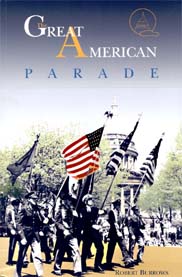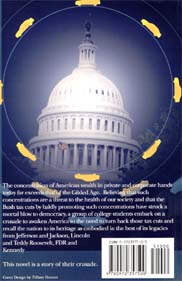The Great American Parade
"It is, in my professional judgment, the worst novel ever published in the English language." -- Gene Weingarten, Washington Post From the back cover:The concentration of American wealth in private and corporate hands today far exceeds that of the Gilded Age. Believing that such concentrations are a threat to the health of our society and that the Bush tax cuts by baldly promoting such concentrations have struck a mortal blow to democracy, a group of college students embark on a crusade to awaken America to the need to turn back those tax cuts and recall the nation to its heritage as embodied in the best of its legacies from Jefferson and Jackson, Lincoln and Teddy Roosevelt, FDR and Kennedy.
This novel is a story of their crusade.
 For a self-published book with a print run of 2,000 copies and sales of 400, The Great American Parade by Robert Burrows has managed to get a considerable amount of attention.
For a self-published book with a print run of 2,000 copies and sales of 400, The Great American Parade by Robert Burrows has managed to get a considerable amount of attention.
After reading Gene Weingarten's review, which includes an interview with the utterly unflappable author, I found a copy from a dealer on Amazon Marketplace.
I'll be reviewing the book here when I finish it. I can't tell yet whether it deserves to be called the worst novel ever, but I'm charmed by the droll and bizarre opening chapter.
The story begins in the White House after the 2000 presidential election has been resolved. George W. Bush begins his presidency by proposing to his advisers a parade that would bring "our kind of people" to Washington (as opposed to the crowd that showed up for Martin Luther King's "I Have a Dream" speech).
My favorite character by far is Secretary of Defense Donald Rumsfeld, who is immediately smitten with the idea.
As Cheney tried to develop a response to Bush's suggestion, Rumsfeld sought to draw the President out: "Do you have something like a World's Fair in mind, Mr. President?" he asked. He'd read about the great expositions in the past century or so. "Something like the Columbian Exposition in Chicago of 1893? The St. Louis Fair of 1903? The Pan-American Fair in San Francisco in 1915? Or the World's Fair in New York in 1939?"
Rumsfeld paused momentarily. Priding himself on his knowledge of American history, he'd always been fascinated by those great, even spectacular public events celebrating America's achievements. He took pleasure in recalling them now, ticking them off in chronological order, evidencing the kind of mastery of detail for which he was famous.
"They were certainly great events," he continued. "Events, indeed, that served to unify Americans because they involved many groups of people working together to showcase our achievements as a nation. Did you have something like that in mind, Mr. President?" he asked.

The book is being sold directly by the author and doesn't appear to be for sale anywhere on the Web. You may be able to reach Burrows through the publisher, Heather Heide House, at 129 North Esterly Ave., Whitewater, WI 53190.
Links related to the book:
- Gene Weingarten's review in the Washington Post
- The official Web site of author Robert Burrows, which includes the full text of the book and his ongoing political commentary
- A letter I received from Robert Burrows
- A publisher, Lulu, is selling print copies and offering it for free online reading.
- Discussion on Metafilter
- Not so great American novel, a review in the Wayne State University school newspaper
- It rained on this parade a review by Brittany Ausmus in the Indiana University school newspaper
- Former professor ties local, national politics in novel, an article by John Krampf in the University of Wisconsin-Whitewater school paper
- Discussion on GeekLife
- Discussion on rec.arts.sf.composition
- Front cover
- Back cover
Add a Comment
All comments are moderated before publication. These HTML tags are permitted: <p>, <b>, <i>, <a>, and <blockquote>. This site is protected by reCAPTCHA (for which the Google Privacy Policy and Terms of Service apply).

